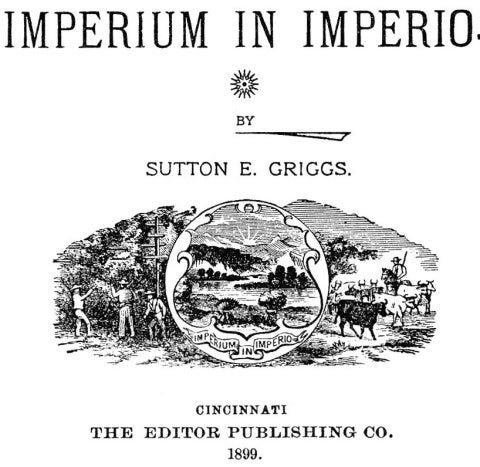Imperium in Imperio: The First Black Dystopia
The first article in a series on Black racial dystopian literature
Update 9/3/2023: I recently became aware of an early Black nationalist novel that may or may not be a proper dystopia. Blake; or The Huts of America was written in 1859 by Black abolitionist Martin Delaney. It does not survive in its entirety, and it’s not clear whether it’s more of a political thriller/revolutionary work than a fictional dystopia, although it certainly portrays the actual dystopia of the slave state. I’ll write more about this in a future installment.
Some of the earliest American political dystopian novels were written by pioneering Black authors, who turned their critical eyes toward the culture of White supremacy that afflicted them, and toward the moral dilemmas of Black resistance.
African-Americans took up their pens and entered the dystopian arms race starting at the end of the 19th century. A generation of writers who had not experienced slavery turned to the question of race relations with sharp, incisive wit, and a critique that extended beyond the obvious evils of White supremacy to explore controversial questions about how black Americans could survive and thrive in a society whose shackles might be more subtle than iron.
While sometimes running parallel in construction to the White supremacist dystopian subgenre that I’ve written about extensively, there are important differences. For one thing, many Black nationalist and racial dystopias far outshine the literary qualities of their White analogues. One factor is the honest pleasure that comes from watching someone punch up, as opposed to the dismay of watching someone punch down. And there’s a keen difference between the writings of people who are genuinely oppressed versus people who imagine they are oppressed.
But it’s more than that. Black racial dystopias are often simply better written and more nuanced than their White counterparts. Trust me. I was an English literature major long before I was an expert on extremism.
The quality of these works makes the exploration of the genre all the more interesting, for scholars of literature and scholars of extremism alike. This is the first in an irregular series looking at some of the key works in this corner of the dystopian literary world. These articles will include spoilers, so I will always lead with a link to the work itself, if you want to read them first. Almost all of these novels are well worth your time, both as historical artifacts and as American literature.
First up: Imperium In Imperio, by Sutton E. Griggs.
You can support this newsletter by ordering with this Amazon link (commission paid). It’s also available for free through the Archive.org lending library.
Sutton Elbert Griggs was the son of a freed slave, born seven years after abolition. After obtaining a secular education, he entered the seminary and became a Baptist preacher, like his father before him. He was an editor, publisher and the author of 33 books, writing extensively and passionately about the racial challenges faced by African-Americans during the post-war and post-Reconstruction era.[i]
Like many born under slavery, Griggs’ father took an “accommodationist” approach in his pragmatic and productive activism, courting the support of White leaders and communities who could provide badly needed resources. His son absorbed many of these attitudes, not always comfortably. His generation necessarily approached the “race problem” from a different perspective, shaped by the legacy of experience and the momentum of passing time. As the younger Griggs wrote in his first novel:
[T]he negro who had endured the hardships of slavery might spend his time looking back and thanking God for that from which he had made his escape; but the young negro, knowing nothing of physical slavery, would be peering into the future, measuring the distance that he had yet to go before he was truly free, and would be asking God and his own right arm for the power to secure whatever rights were still withheld.
Griggs could easily have been describing himself. A member of that generation raised up after the end of slavery, Griggs too “peered into the future,” a perspective that shaped his activism, as well as his writing, leading him to become the first recorded African-American author of dystopian fiction.
Imperium in Imperio (1899) was the first of Griggs’ five novels and his only futuristic fiction. The book chronicles the emergence of a violent plot to establish a Black separatist state in the heart of Texas.[ii] The following discussion includes significant plot details, including the ending of the book.
Imperium in Imperio (meaning, essentially, a state within a state) follows the lives of two equally brilliant young men, Belton Piedmont and Bernard Belgrave, who seem to externalize Griggs’ conflicted internal political landscape.
Belton was a gentle soul from a poor family, who grew up to believe in the possibility of racial reconciliation, only to have his convictions continually tested by a drumbeat of discrimination and oppression. Bernard, the secret biracial love child of a White senator, grew up with every advantage available to an African-American of his day.
Bernard turns to separatist militancy after the love of his life commits suicide, leaving a note explaining she could not dilute the potency of the Black race by marrying a mulatto (an opinion she explicitly attributes to a credulous reading of a non-fictional White supremacist pamphlet). Her note urges Bernard to apply his considerable talents to separating the races forever, and he embraces that cause.
Belton and Bernard join a secret society, dating back to the days of the Revolutionary War and greatly expanded after the abolition of slavery. In light of the federal government’s failure to secure the rights of African-Americans under the law, the organization creates a sovereign shadow government “that would protect the negro in his rights,” complete with its own Congress, judiciary and executive. Belton becomes speaker of the House, while Bernard is elected president.
Some years pass until a crisis finally comes to fruition. Frustrated by the lack of progress toward racial equality, the Imperium in Imperio initiates a debate on how to finally resolve the conflict between “Anglo-Saxons and Negroes.” Belton and Bernard argue for different approaches in lengthy speeches that comprise the penultimate chapters of the book.
For Bernard, militancy is the only answer to the multitudinous crimes committed in the name of White supremacy. Belton argues against him, calling for a patient but assertive approach, political and nonviolent.
In the end, the Imperium throws its support behind Bernard’s plan to seize Texas and Louisiana by force, bartering the latter to unspecified foreign occupiers in exchange for support, and instituting a sovereign African-American homeland in the former.
As the book concludes, Belton condemns the plan as treason to the United States, and refuses to support it. The Imperium sentences him to death for treason against the Imperium. Afterward, the violent scheme is exposed and foiled by another conscience-stricken member—the book’s narrator, who also faces a traitor’s execution at the hands of the Imperium as the story concludes.
The treatment of race in Imperio in Imperium is dauntingly complex, perhaps fairly described as confused. Griggs explores the utility of various attitudes and strategies for the cause of Black liberation, exploring them in an even-handed way. Although Belton’s view seems clearly to reflect the author’s preference, the merits of a more militant approach are fully and sympathetically aired. Obliquely suggesting a parallelism between White and Black supremacist ideologies, the pamphlet that radicalizes Bernard’s suicidal love interest has the same title as a real-world influential White racist tract, “White Supremacy and Negro Subordination,” although the contents described are different from the original.
These narrative conflicts seem to parallel Griggs’ own struggle to find the right road forward for African-Americans and the competing appeals of accommodationism and a more militant vision of Black nationalism.[iii] The tension between these poles would play out time and again in a series of dystopian novels that proposed violent or creative scenarios to address the problem of White supremacy from a Black perspective. In the hands of minorities, tales of near-future race war, once primarily the demesne of White racists seeking to preserve a vanishing status quo, frequently presented explorations—and sometimes stark warnings—about the morality of violent tactics and goals, and the peril of getting what you wished for.
To be continued…
[i] "Sutton E. Griggs." Oxford Reference. Date of access 10 Mar. 2019, http://www.oxfordreference.com/view/10.1093/oi/authority.20110803095908448; Coleman, Finnie D. Sutton e. griggs and the struggle against white supremacy. Univ. of Tennessee Press, 2007.
[ii] Briggs, Gabriel A. "Imperium in Imperio: Sutton E. Griggs and the New Negro of the South." Southern Quarterly 45.3 (2008): 153; Fleming, Robert E. "Sutton E. Griggs: Militant Black Novelist." Phylon (1960-) 34.1 (1973): 73-77.
[iii] https://archive.is/20010725000820/http://www.issues-views.com/index.php/sect/1000/article/1015 https://books.google.com/books?id=uA_UCgAAQBAJ&lpg=PP1&pg=PA2#v=onepage&q&f=false





